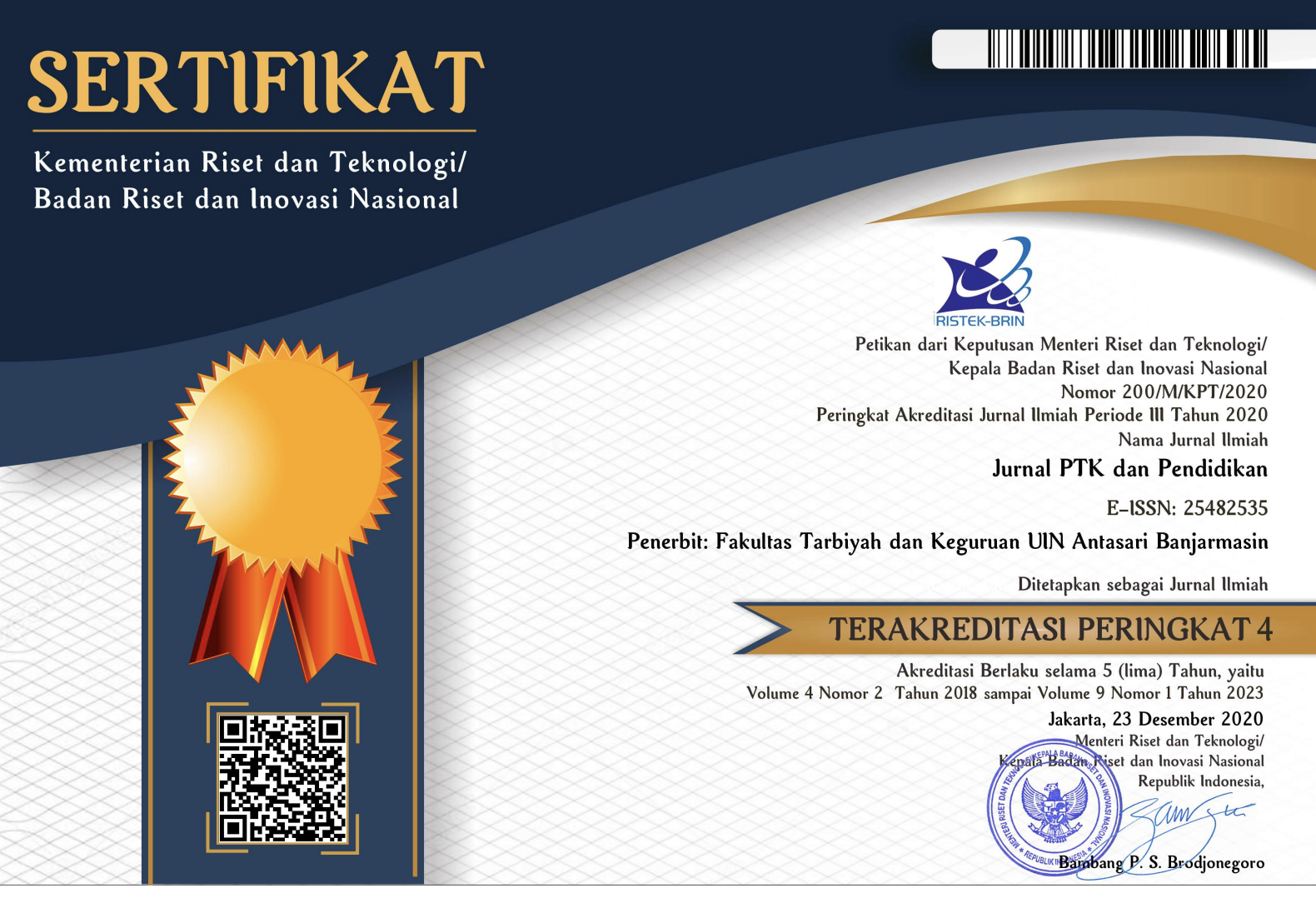PREPARING STUDENTS OF SMKN 7 KOTA SERANG FOR 21ST CENTURY WORK ENVIRONMENT THROUGH PJBL
DOI:
https://doi.org/10.18592/ptk.v9i2.11554Abstract
The 21st-century work environment presents new challenges for education. Therefore, preparing students to face the 21st-century work environment requires innovative and relevant educational approaches. This study aims to analyze the preparation of SMKN 7 Serang City students in facing the 21st-century work environment through a project-based learning (PjBL) approach. This research uses a descriptive quantitative approach, data in the form of questionnaires are analyzed to identify teamwork, project management, communication skills, interpersonal skills, and problem-solving. The results showed that PjBL has made a positive contribution to improving students' 21st-century skills. Students involved in PjBL have a deeper understanding of the application of theoretical concepts in the context of the work environment. The conclusion is that PjBL is an effective learning method in preparing students of SMKN 7 Serang City for the 21st-century work environment. The results of this study confirm the importance of innovative approaches in vocational education to ensure students have skills and knowledge relevant to future developments.References
Awaluddin, A., Ramadan, F., Charty, F. A. N., Salsabila, R., & Firmansyah, Mi. (2021). Peran Pengembangan dan Pemanfaatan Teknologi Pendidikan dan Pembelajaran Dalam Meningkatkan Kualitas Mengajar. Jurnal PETISI (Pendidikan Teknologi Informasi), 2(2), Article 2. https://doi.org/10.36232/jurnalpetisi.v2i2.1241
Banarsari, A., Rizki, D., & Akmal, A. (2023). Pemanfaatan Teknologi Pendidikan Pada Abad 21. Social, Humanities, and Educational Studies (SHES): Conference Series, 6, 459. https://doi.org/10.20961/shes.v6i1.71152
Bonev, A. (2017). What Skills We Need to Stay Relevant in the 21st Century Workforce. Mesium.Com. https://medium.com/the-looking-glass/what-skills-we-need-to-stay-relevant-in-the-21st-century-workforce-d269f592f14
Crespí, P., Manuel García-Ramos, J., & Queiruga-Dios, M. (2022). Project-Based Learning (PBL) and Its Impact on the Development of Interpersonal Competences in Higher Education. Journal Of New Approaches In Educational Research, 11(2), 259–276. https://doi.org/10.7821/naer.2022.7.993
Edalex. (2021). 21st-Century Skills—Credentialate Guide to What They Are, Importance. Edalex.Com. https://www.edalex.com/guides/21st-century-skills-what-they-are-why-important/
Fitriyah, A., & Ramadan, S. D. (2021). Pengaruh pembelajaran STEAM berbasis PjBL (Project-Based Learning) terhadap keterampilan berpikir kreatif dan berpikir kritis. Urnal Inspiratif Pendidikan, 10(1), 209–226.
Hamzah, A. R., Mesra, R., Br Karo, K., Alifah, N., Hartini, A., Gita Prima Agusta, H., Maryati Yusuf, F., Endrawati Subroto, D., Lisarani, V., Ihsan Ramadhani, M., Hajar Larekeng, S., Tunnoor, S., Bayu, R. A., & Pinasti, T. (2023). Strategi Pembelajaran Abad 21. PT. Mifandi Mandiri Digital.
Hidayat, R., & Abdillah, A. (2019). Ilmu Pendidikan: Konsep, Teori Dan Aplikasinya. Lembaga Peduli Pengembangan Pendidikan Indonesia (LPPPI).
Indeed. (2022). 21st-Century Skills: Definition and Examples. Indeed.Com. https://www.indeed.com/career-advice/career-development/21st-century-skills
Isma, A., Isma, A., Isma, A., & Isma, A. (2023). Peta Permasalahan Pendidikan Abad 21 di Indonesia. Jurnal Pendidikan Terapan, 11–28. https://doi.org/10.61255/jupiter.v1i3.153
Kozlowski, S. W. J., & Ilgen, D. R. (2006). Enhancing the efectiveness of work groups and teams. Psychological Science in the Public Interest, Supplement, 7(3), 77–124. https://doi.org/10.1111/J.1529-1006.2006.00030.X/ASSET/IMAGES/LARGE/10.1111_J.1529-1006.2006.00030.X-FIG1.JPEG
Kusumaningrum, Esti, M., Roshayanti, F., & Minarti, I. B. (2021). Pola tipe model dalam lembar kerja siswa (LKS) MGMP biologi SMA. Bioeduca: Journal of Biology Education, 3(1), 10–19. https://doi.org/10.21580/bioeduca.v3i1.6617
Mardhiyah, R. H., Aldriani, S. N. F., Chitta, F., & Zulfikar, M. R. (2021). Pentingnya Keterampilan Belajar di Abad 21 sebagai Tuntutan dalam Pengembangan Sumber Daya Manusia. Lectura : Jurnal Pendidikan, 12(1), 29–40. https://doi.org/10.31849/lectura.v12i1.5813
Melguizo-Garín, A., Ruiz-Rodríguez, I., Peláez-Fernández, M. A., Salas-Rodríguez, J., & Serrano-Ibáñez, E. R. (2022). Relationship Between Group Work Competencies and Satisfaction With Project-Based Learning Among University Students. Frontiers in Psychology, 13, 811864. https://doi.org/10.3389/FPSYG.2022.811864/BIBTEX
Nurhaedah, Supriadi, & Satriani. (2020). Penerapan Model Pembelajaran Project Based Learning Berbasis Pembelajaran Abad 21 dalam Meningkatkan Keterampilan Menulis Siswa di Kabupaten Gowa. ALGAZALI| International Journal of Educational Research, 3(1), 65–74.
Nurtanto, M., Sofyan, H., Fawaid, M., & Rabiman, R. (2019). Problem-based learning (PBL) in industry 4.0: Improving learning quality through character-based literacy learning and life career skill (LL-LCS). Universal Journal of Educational Research, 7(11), 2487–2494. https://doi.org/10.13189/ujer.2019.071128
Rahayu, R., Iskandar, S., & Abidin, Y. (2022). Inovasi Pembelajaran Abad 21 dan Penerapannya di Indonesia. Jurnal Basicedu, 6(2), Article 2. https://doi.org/10.31004/basicedu.v6i2.2082
Sinta, M., Sakdiah, H., Novita, N., Ginting, F. W., & Syafrizal, S. (2022). Penerapan Model Pembelajaran Project Based Learning (PjBL) untuk Meningkatkan Kemampuan Berpikir Kreatif Siswa pada Materi Hukum Gravitasi Newton di MAS Jabal Nur. Phi: Jurnal Pendidikan Fisika dan Terapan, 8(1), Article 1. https://doi.org/10.22373/p-jpft.v3i3.14546
Wagiran. (2009). Paradigma Peningkatan Mutu Lulusan SMK Melalui Integrasi Soft Skills untuk Menghasilkan Lulusan Unggul dan Berdaya Saing. Seminar Nasional Paradigma Baru Mutu Pendidikan Di Indonesia, 1–22.
Yoto, Marsono, Sutadji, E., Wibawa, A. P., & Dwiyanto, F. A. (2022). Project–Based Learning At Vocational School of Machinery and Construction Engineering Through the Center of Excellence Program. Journal of Positive School Psychology, 6(5), 8902–8913.
Downloads
Published
How to Cite
Issue
Section
License
Copyright (c) 2024 Sanam, Sulaeman Deni Ramdani, Triyo Susanto

This work is licensed under a Creative Commons Attribution 4.0 International License.
- The right to publication of all journal material published on the Jurnal PTK dan Pendidikan website is held by the editorial board with the author's knowledge (moral rights remain the property of the author).
- The formal legal provisions for access to digital articles of this electronic journal are subject to the terms of the Creative Commons CC BY 4.0 DEED Attribution International (CC BY) license. This license enables reusers to distribute, remix, adapt, and build upon the material in any medium or format, so long as attribution is given to the creator. The license allows for commercial use.
- Printed and electronic published manuscripts are open access for educational, research and library purposes. In addition to these objectives, the editorial board shall not be liable for violations of copyright law.






